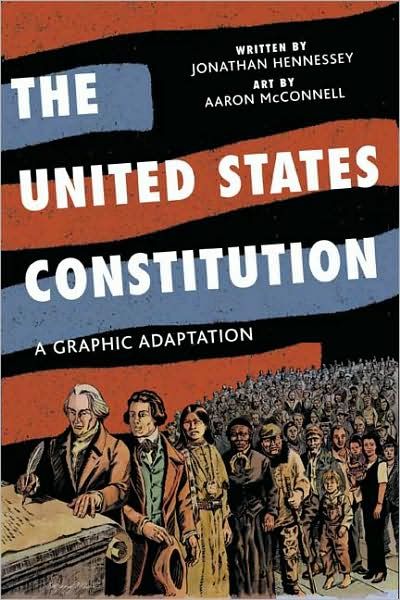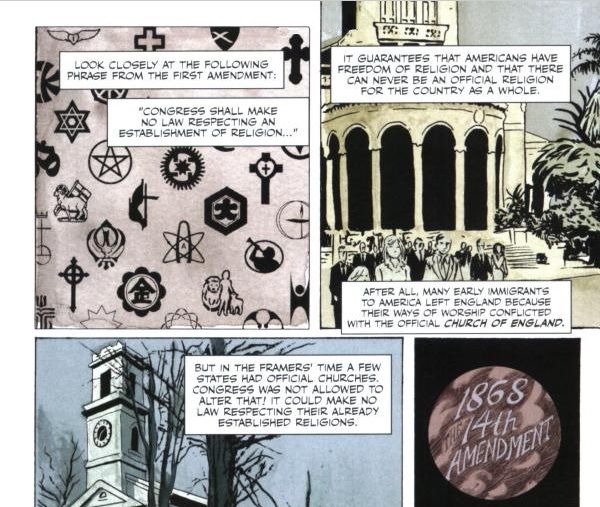Book-It 'o13! Book #29
The Fifty Books Challenge, year four! (Years one, two, three, and four just in case you're curious.) This was a library request.

Title: The United States Constitution: A Graphic Adaptation written by Jonathan Hennessey, illustrated by Aaron McConnell
Details: Copyright 2008, Hill and Wang
Synopsis (By Way of Back Cover): "Most of us can recall 'We the People' without trouble; maybe we get so far as 'in order to form a more perfect union.' But how many of us truly know our Constitution? What principles and beliefs guided its authors? How does a bill become a law? The United States Constitution: A Graphic Adaption is hands-down the easiest, most entertaining, most memorable introduction to America's founding document. Taking us from the Founding Fathers to the Freedom Riders, from the Preamble to the Twenty-seventh Amendment, this is the United States Constitution for anyone and everyone."
Why I Wanted to Read It: I went on a "ANY GRAPHIC NOVELS PLZ" hunt at my local library.
How I Liked It: The book has a difficult job to do and even attempting this book was a laudable goal.
The book is packed with visual metaphors (some of them searing; slaves are literally depicted as three fifths of a person) that are actually really useful. Navigating around the jingoism and heavy-handed patriotism (one is reminded of Lies My Teacher Told Me: Everything Your American History Textbook Got Wrong's author James Loewen's observation that no science book is titled "The Rise of the Molecule" and approached with such a worshipful stance of the subject; the same should be true of history books) is quite a task, which brings us to what is probably the book's single biggest misstep.
Other such books that navigate from the angle of explaining a difficult subject in graphic novel form such as Economix and The Influencing Machine employ characters as their narrators (in both cases, the respective authors). Such narrators carry the reader through the book, and separate from quotations, philosophical panels (such as the visual metaphors), and other text. This book desperately needs such a narrator, as too often the thread is sidelined and lost.
Of course, with what is proclaiming to be an adaption of a document rather than original material, selecting such a narrator becomes tricky. If selecting the author (as in the cases of the previous two works I mentioned), the book risks becoming Jonathan Hennessey's The United States Constitution. Choosing a fictional character? You risk going too cutesy and the book has "I'm Just a Bill" comparisons as it is.
It's a shame the creators never found a narrative device that would strike the right balance, because heavy-handed patriotism aside, there's a good deal of worthwhile information translated and to consider.
Notable: Much appreciated was a symbol found on their section regarding freedom of religion.


Title: The United States Constitution: A Graphic Adaptation written by Jonathan Hennessey, illustrated by Aaron McConnell
Details: Copyright 2008, Hill and Wang
Synopsis (By Way of Back Cover): "Most of us can recall 'We the People' without trouble; maybe we get so far as 'in order to form a more perfect union.' But how many of us truly know our Constitution? What principles and beliefs guided its authors? How does a bill become a law? The United States Constitution: A Graphic Adaption is hands-down the easiest, most entertaining, most memorable introduction to America's founding document. Taking us from the Founding Fathers to the Freedom Riders, from the Preamble to the Twenty-seventh Amendment, this is the United States Constitution for anyone and everyone."
Why I Wanted to Read It: I went on a "ANY GRAPHIC NOVELS PLZ" hunt at my local library.
How I Liked It: The book has a difficult job to do and even attempting this book was a laudable goal.
The book is packed with visual metaphors (some of them searing; slaves are literally depicted as three fifths of a person) that are actually really useful. Navigating around the jingoism and heavy-handed patriotism (one is reminded of Lies My Teacher Told Me: Everything Your American History Textbook Got Wrong's author James Loewen's observation that no science book is titled "The Rise of the Molecule" and approached with such a worshipful stance of the subject; the same should be true of history books) is quite a task, which brings us to what is probably the book's single biggest misstep.
Other such books that navigate from the angle of explaining a difficult subject in graphic novel form such as Economix and The Influencing Machine employ characters as their narrators (in both cases, the respective authors). Such narrators carry the reader through the book, and separate from quotations, philosophical panels (such as the visual metaphors), and other text. This book desperately needs such a narrator, as too often the thread is sidelined and lost.
Of course, with what is proclaiming to be an adaption of a document rather than original material, selecting such a narrator becomes tricky. If selecting the author (as in the cases of the previous two works I mentioned), the book risks becoming Jonathan Hennessey's The United States Constitution. Choosing a fictional character? You risk going too cutesy and the book has "I'm Just a Bill" comparisons as it is.
It's a shame the creators never found a narrative device that would strike the right balance, because heavy-handed patriotism aside, there's a good deal of worthwhile information translated and to consider.
Notable: Much appreciated was a symbol found on their section regarding freedom of religion.
